While Udemy has become a household name for digital education, it’s not the only player in town. But it can get expensive, hence I bring you the Best Udemy Alternatives.
Whether you’re looking to master a new skill, advance your career, or simply satisfy your curiosity, there are plenty of learning options waiting to be explored.
In this article, I have reviewed websites like Udemy in detail that might just be your perfect educational match.
Let’s get into the details!
Top 11 Websites Like Udemy: In A Nutshell (2025)
Let us have a quick look at the Udemy Alternatives before going into details.
| Websites | Ratings | Best suited |
| Skillshare | 4.5/5 | Interpersonal Communications to Technology |
| Thinkific | 4.7/5 | Business operations |
| Teachable | 4.5/5 | Creating Online Courses |
| Udacity | 4.6/5 | Data science and programming |
| Coursera | 4.5/5 | Accredited courses |
| Pluralsight | 4.3/5 | To learn technical skills |
| Masterclass | 4.7/5 | Learning from industry leads |
| LinkedIn Learning | 4.6/5 | Business applications |
| eDx | 4.5/5 | To continue learning |
| Codecademy | 4.8/5 | Learning to code |
| Khan Academy | 4.5/5 | Best for school children for free courses |
Here is a detailed list of the best websites like Udemy to consider in 2025.
1. Skillshare
Skillshare was established in 2010 and now has over 12 million users.
In the same way as Udemy, you’ll register as a course creator, create the course material, and then post it. The Skillshare marketplace handles promotion and links students with knowledgeable business professionals.

The subscription-based business model that Skillshare employs is one of the main distinctions between it and Udemy. Students on Udemy pay for each course individually, whereas on Skillshare, there is a single cost for access to all courses. Read our detailed review on Skillshare
Key Features
- Free Training
- Catalog of Class Creation Premium Courses
- Setting up channels
- Experience Learning Together
- Education via Support Publishing Courses
- Group Lessons
Pros
- Usually, there is a good balance between theory and practice in classes.
- A vibrant neighborhood that can encourage and engage students
- With curated learning, you may easily carry on your educational journey without having to spend too much time deciding where to go next.
- The excellent class review system on Skillshare enables the algorithm to choose the most appropriate classes for you.
- Benefits from Skillshare: Savings on Adobe, Canva, Freshbooks, and more
Cons
- There is no instructor quality control.
- Ads that are annoying at the free membership level
Pricing Structure
Skillshare usually costs around $13.99/month, and the team plan costs $159 per user annually.
2. Thinkfic
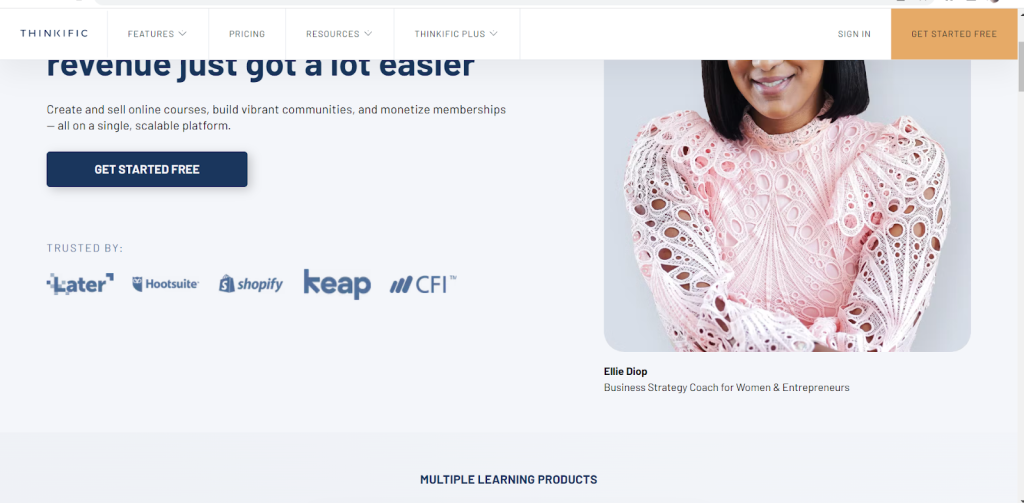
You want to create, host, market, and profit entirely from your online courses. Consider Thinkific as an alternative to Udemy. The online learning platform, which was developed in Vancouver, provides you with all the tools necessary to sell courses on a website with your own branding.
The Course Builder is the standout feature of Thinkific. You’ll have access to a variety of templates that will enable you to efficiently organize your content and design courses. To increase enrollment in a flagship course, you can develop mini-courses, pre-sell landing pages that can help you gauge demand, and flagship courses, where you’ll go in-depth and give students the most benefit.
Key Features
- Even without prior course-building skills, create courses.
- Modify templates using a drag-and-drop web page builder to create landing pages for your courses.
- Marketing and advertising coupons, sales widgets, and affiliate marketing built-in.
- Choose a pricing strategy for your students: a one-time payment, regular payments, or memberships.
- Reporting: Thinkific keeps tabs on enrollments, orders, and revenue.
- Communities that help students: Provide students access to a community of online discussion.
Pros
- Save more of your earnings. You profit from the products you sell. A 30% cut is not acceptable to Thinkific.
- Adaptable. You are responsible for the website’s and the learning experience’s branding.
- Custom domains: Provide advanced customizations.
- An extensive free plan. For beginning creators, Thinkific’s free tier offers a plethora of options.
- Fixed monthly cost. You’ll keep more of the proceeds from each sale.
Cons
- You’ll need to promote your services.
- Institutions do not provide certificates.
Pricing Structure
| Billed | Free | Basic | Start | Grow |
| Monthly | $0 | $49/month | $99/month | $199/month |
| Annually | $0 | $36/month | $74/month | $149/month |
3. Teachable
Teachable is #1 platform when it comes to creating an online course, especially for creators seeking a platform that offers greater control over their courses and branding.
Unlike Udemy’s marketplace model, Teachable allows instructors to build fully customized online schools, complete with their own domain names and branding.
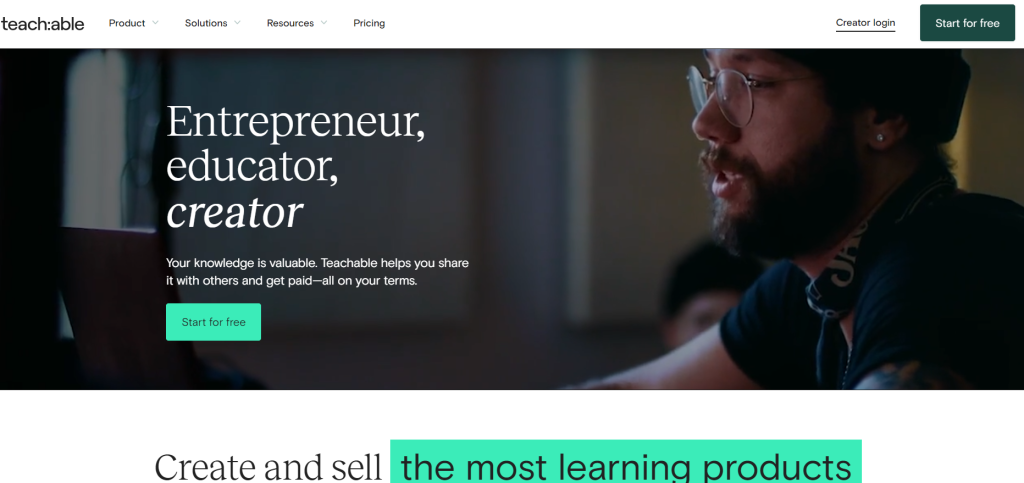
This autonomy enables course creators to maintain full ownership of their content and set their pricing models. Additionally, Teachable’s user-friendly interface and robust set of tools cater to both beginners and seasoned course developers.
Teachable also provides extensive marketing and analytics tools, making it a comprehensive solution for educators looking to grow their online presence.
Key Features:
- Custom domain and branding.
- Integrated payment processing.
- Drip content scheduling.
- Student progress tracking.
- Built-in affiliate marketing.
- Support for various multimedia formats.
Pros:
- Full ownership of content.
- Flexible pricing options.
- Comprehensive analytics and reporting.
- Integration with third-party tools.
- User-friendly course builder.
Cons:
- Transaction fees on lower-tier plans.
- Limited course marketplace exposure compared to Udemy.
Pricing Structure
| Billed | Basic | Pro | Pro+ |
| Monthly | $59/month | $159/month | $249/month |
| Annually | $39/month | $119/month | $199/month |
4. Udacity
Udacity’s major goal is to “train the world’s workforce in the occupations of the future,” with 10 million students from 160 countries and 23k graduates.
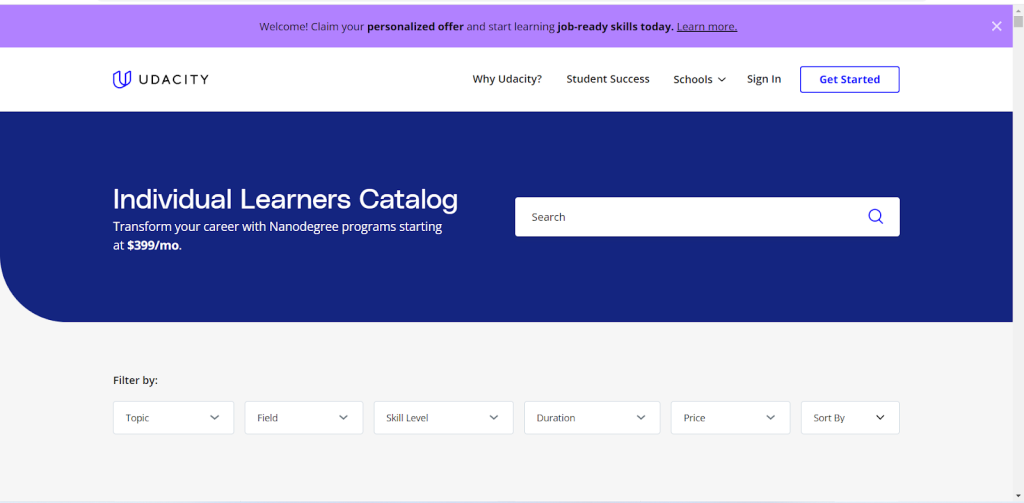
Unlike Udemy, it collaborates with business leaders to provide “project-based” online courses that help students develop the technical abilities that companies value most. As a result, it only allows high-quality videos on its platform.
Learn more about Udacity with our comprehensive review.
Key Features
- Emphasis on technology and career-oriented courses
- Project-based learning
- Design of Nanodegree programs
- Provide Industry partnerships
- Rigorous assessment and feedback
Pros
- High-quality content to all courses
- Design is Simple to use: Their backend is simple to understand and use.
- Provides advanced Free courses:
- Certifications
- Enhance your resume
Cons
- You will require a budget: Udacity is not inexpensive, as we’ll find it costly.
- Not a large community: There doesn’t appear to be an exciting, engaging community supporting Udacity courses.
Pricing Structure
Udacity offers plenty of free courses. However, a nano degree from Udacity can range between $100-$1000, depending on the course. It also offers a monthly plan starting from $399 per month.
5. Coursera
One of the biggest learning platforms in the world is called Coursera. It was founded in 2012 by two Stanford academics with the goal of granting everyone access to top-notch education.

Coursera attained unicorn status (a $1 billion+ valuation) only seven years later. It drew as many students in 2020 alone as its closest rival did over the course of their entire history. Read our detailed blog on Coursera Plus Review to understand the working and courses of Coursera.
Key Features
- Perform Skill evaluation
- Creates Learning avenues
- Gap analysis of skills
- Check for comprehension
- Engines that recommend courses
- Interactive content Development of job-based skills
- intuitive in the classroom
- Strategic management of customer success
- Tool for programme management
- LMS integration with customized content curation
Pros
- Leading scholars, Nobel laureates, best-selling authors, C-suite executives, and industry experts provide instruction.
- The opportunity to obtain a credential approved by one of the top organisations in the world
- You can sample a lot of free content risk-free.
- Courses with adequate structure and resources
- Large selection of courses
- Pristine education at reasonable costs
Cons
- Confusing price system and difficulty to locate free material
- Coursera has very few Humanities and Data Science courses
Pricing Structure
| Single learning platform | Coursera Monthly | Coursera Annually |
| $49-$79/monthly | $59/month | $399/year |
Coursera also offers a 7-day free trial before making the final purchase. After completing the free trial, you can also use our working Coursera Plus discount and get up to 40% off.
6. PluralSight
In 2004, Aaron Skonnard and several other IT experts launched Pluralsight. The company’s library contains more than 7,000 courses taught by more than 1,400 subject-matter experts.
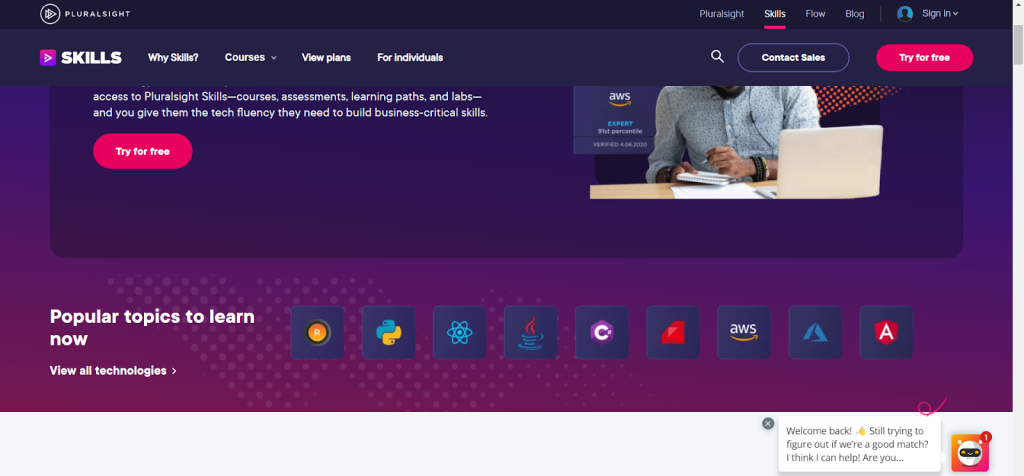
The company aims to train both individuals and corporations in the tech skills of the future. Cybersecurity, IT operations, and software development are all covered topics.
Key Features
- Offline viewing and apps. Using our mobile, laptop, and TV apps, learners with an active Skills subscription or licence can watch videos of courses.
- A completion certification. Exam preparation and certification pathways….
- Channels, extensions, and so on.
- Practical training.
- Learning assessments.
- Priorities for students.
- Q&A facility
- More things
Pros
- A wide variety of technical courses
- Free examinations of roles and skills
- Exceptionally skilled instructors
- Prepares you for a world and job market that are changing
- Other educational resources, such as labs and pathways
- Complimentary trial of the platform for 10 days or 200 minutes, whichever comes first, to give you a solid idea of what it offers.
- You can learn offline and on the fly thanks to good email and phone support.
Cons
- Exclusively on topics related to technology
- No free material (other than what you can get through in the free trial)
Pricing Structure
Pluralsight has individual and team plans
First, let us have a quick look at the individual plan.
| Billed | Standard | Premium |
| Monthly | $29/month | $45/month |
| Annually | $299/year | $359/year |
Team plan has further been divided into:
| Billed | Starter | Professional | Enterprise |
| Monthly | $33.25/month | $48.25/month | $64.91/month |
| Annually | $399/year | $579/year | $779/year |
7. MasterClass
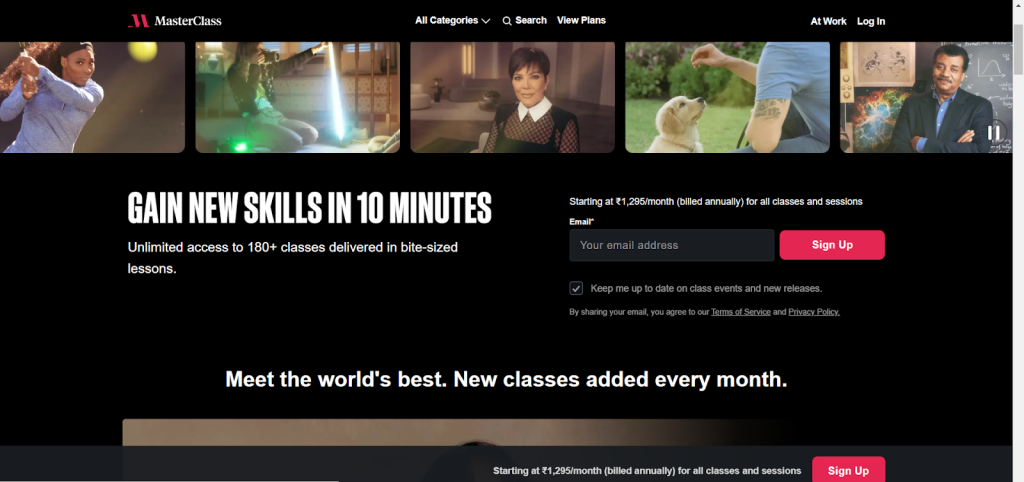
With the straightforward premise that everyone should have access to greatness, MasterClass was established in 2015. Its 150+ MasterClasses are offered in 11 categories and are instructed by world-renowned experts in their professions.
MasterClass is famous for its cinematic production standards, the caliber of its instructors, and the way it uses storytelling to forge a bond between the teacher and you, the audience.
MasterClass is our top pick. We have also done a detailed MasterClass review sharing our team’s experience that you can read before deciding if it’s a right platform for you.
Key Features
- Famous people and professionals from the sector enrol in courses.
- Address specific themes so that students can gather useful information on subjects that interest them.
- Reasonably priced subscription compared to many other options
Pros
- Learn from the finest with devoted, renowned, and talented teachers. A wide selection of classes are available.
- Affordable, with opportunities for many users
- Access to meetings you attend as a group of students
- High production standards and captivating, enjoyable material
- 30 days of no-questions-asked refunds
Cons
- There are no free classes, but you can try out classes for free.
- Apparent lack of completion certificates
Pricing Structure
| Individual | Duo | Family |
| $15 | $20 | $23 |
8. LinkedIn Learning
Before spending any money, users of LinkedIn have a whole month to test out the platform.
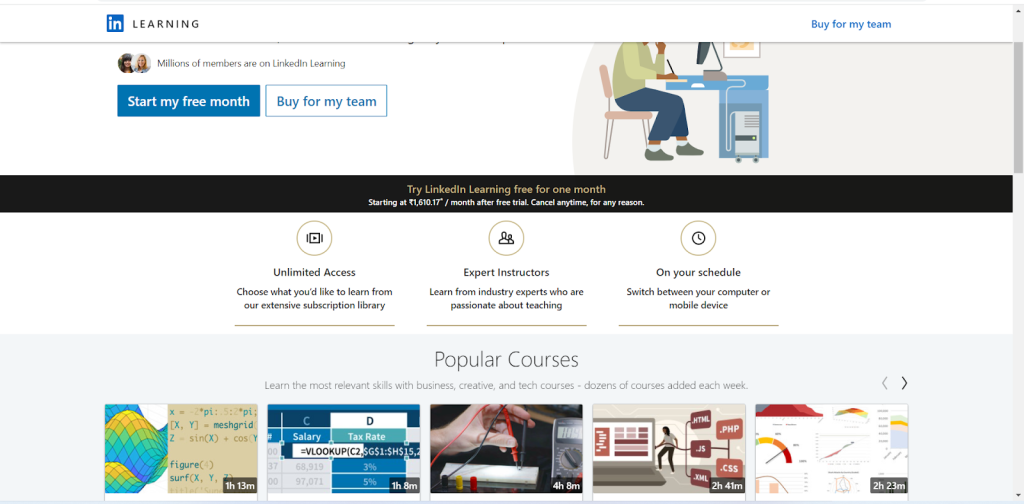
LinkedIn Learning is undoubtedly a platform you should try if you want to get a true sense of it before committing to a purchase. If you feel the platform is not for you, don’t forget to cancel your subscription before the free trial is up.
Key Features
- Every course at LinkedIn Learning is focused on enhancing students’ real-world abilities so they can use what they learn on the job.
- The majority of these courses can help you increase your chances of finding a good career in your sector of interest.
- This website focuses on a variety of business and marketing courses.
Pros
- Learn from educators with a wealth of practical knowledge.
- Possibility of obtaining and displaying a LinkedIn Learning certificate
- With a wide range of themes to choose from
- You have a full month to assess whether the platform is right for you during the free trial period.
- The capability of adding courses to a mobile app for offline viewing while traveling
Cons
- None of the certificates are accredited.
- Major emphasis on business and technological concerns
Pricing Structure
| Monthly | Annually |
| 39.99/month | $19.99/month |
LinkedIn Learning also comes with a free trial. Check out more details on how to access the free trial here.
9. edX
Like Udemy, edX collaborates with prestigious organizations and colleges to provide free, open-access online education.
The company was created in 2012 because MIT and Harvard were working together.

Since then, more than 160 other schools have joined edX, which currently has 100 million students enrolled and 3,500+ courses spread over 30 topic areas.
Key Features
- Learning assessments as the student moves through Learning assessment as a student moves through a course
- Right-to-left language support, course, and learner analytics
- Cohort-specific content and discussions
- Learning assessments as and when the student shifts through a course, self-paced training, online discussion forums, wiki-based collaborative learning, and digital courses
Pros
- 3,500 classes in a variety of subject areas
- Lectures from distinguished academics at the top universities in the world, many of whom have won Nobel Prizes
- With the opportunity to pay for a certificate, thousands of free programs are available.
- Courses are delivered with an excellent blend of audio, visual, and textual teaching methods, and they are incredibly thorough.
- The collaborating institutions and universities accredit certificates.
- Several of its courses don’t require certification and can be taken for free.
Cons
- Compared to its competitor, Udemy, the edX website is a little more difficult to use.
Pricing Structure
Most of the edX courses can be viewed for free by clicking on audit tracks. You can buy lectures and classes for a certificate that costs around $50-300. Some of the edX courses can also range up to $2000. It also offers special plans for groups and enterprises.
You can also learn about EDX in detail with our review.
10. Codecademy
As its name suggests, Codecademy is an online learning platform that provides courses that teach coding.
Its courses, which span 14 different programming languages, are meant to cater to students of all skill levels. Hence, Codecademy has something for everyone, whether you’re just beginning your coding career, want to learn a new language, or want to sharpen your current skills.
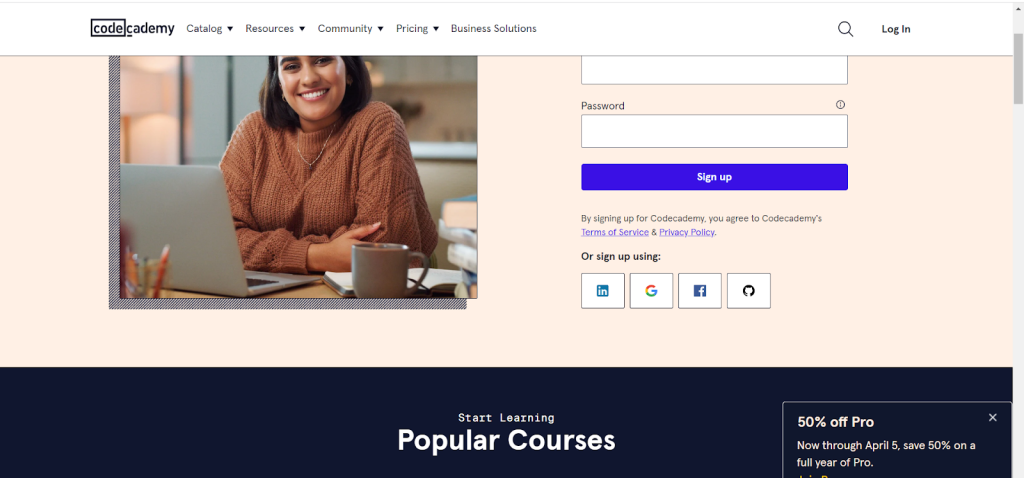
Think Codecademy is your perfect fit? Read our Codecademy review to learn about the platform in-depth!
Key Features
- Projects, Challenge Projects, and Portfolio Projects
- Certificates of accomplishment
- Professional Certifications
- Career routes and skill paths.
- Preparation for interviews, tests, exercises, and cheat sheets.
Pros
- Free basic coverage allows you to access a variety of lessons and daily activities
- Provides classes for students of all skill levels, including beginners.
- There are 14 programming languages covered, such as HTML, Javascript, Python, and C#.
- A strong network to aid you in your learning
- Allows you to accumulate a portfolio of works to show prospective employers
Cons
- There is no accreditation for completion certificates.
Pricing Structure
| Individual (Pro) | Student | Team |
| Annual-$29.99/month, Month- $59.99 | $149.99/yearly | $299 per user, yearly |
11. Khan Academy
Khan Academy is a nonprofit educational organization founded in 2008 by Salman Khan. It offers a vast array of free online courses, tutorials, and practice exercises covering subjects from mathematics and science to arts and humanities.

The platform caters to learners of all ages, from elementary school students to adults seeking continuing education. Khan Academy’s mission is to provide a world-class education for anyone, anywhere, at no cost.
With its user-friendly interface, personalized learning paths, and high-quality instructional videos, Khan Academy has become a popular resource for students, teachers, and self-directed learners worldwide, revolutionizing digital education access.
Key Features
- Extensive library of educational content
- Personalized learning dashboard
- Interactive practice exercises
- Progress tracking and assessment tools
- Multilingual support
Pros
- Free access to quality education
- Self-paced learning environment
- Comprehensive subject coverage
- Aligned with educational standards
Cons
- Limited direct teacher interaction
- Internet access necessary
- Not a formal degree program
Pricing Structure
Khan Academy’s core educational content and features are free for all users. The platform is funded through donations and partnerships, allowing it to maintain its commitment to providing free education.
While there are no subscription fees or hidden costs for accessing the main content, Khan Academy offers additional paid services for schools and districts, such as professional development programs for teachers and implementation support.
Editor’s Notes💡: If you’re looking for self-help courses, you can also check out Mindvalley. Unlike Udemy, it doesn’t offer courses directly to improve your skills, but they are proven to help you improve your life with its holistic courses. You can try Mindvalley for free for seven days!
More reads you can check out:
- Coursera vs LinkedIn Learning
- Skillshare vs Masterclass
- Coursera Alternatives & Competitors
- Best Pluralsight Alternatives & Competitors
Final Notes: Coursera, Thinkific, & Teachable Are Our Recommended Udemy Alternative
If you are ready to study and want to improve your skills in your field of interest, it is time to select one of the most beneficial platforms from the list above.
You can enroll in courses based on your field of expertise, and soon, these qualified lectures will assist you in obtaining your ideal position in the market.
From MasterClass to Khan Academy, all these websites, like Udemy, offer excellent courses that you can take advantage of.
Most websites offer free courses, and those who pay for them receive certifications; you can select your class based on your level of interest in the subject.
FAQs
Coursera, LinkedIn Learning, and edX are better than Udemy.
Because they are not authorized by or supported by a university, this platform’s certificates lack credibility, which is one of its main issues.
The quick answer is no; Udemy certificates are not authorized in and of themselves. Any credentials won’t be recognized as formal because Udemy is not an approved university. There are Udemy courses, though, that have earned independent organization accreditation.
If you want access to various reasonably priced courses, Udemy is the way to go. At the same time, Coursera is the way to go if you want a structured course or program taught by professors from a reputable university or organization.

